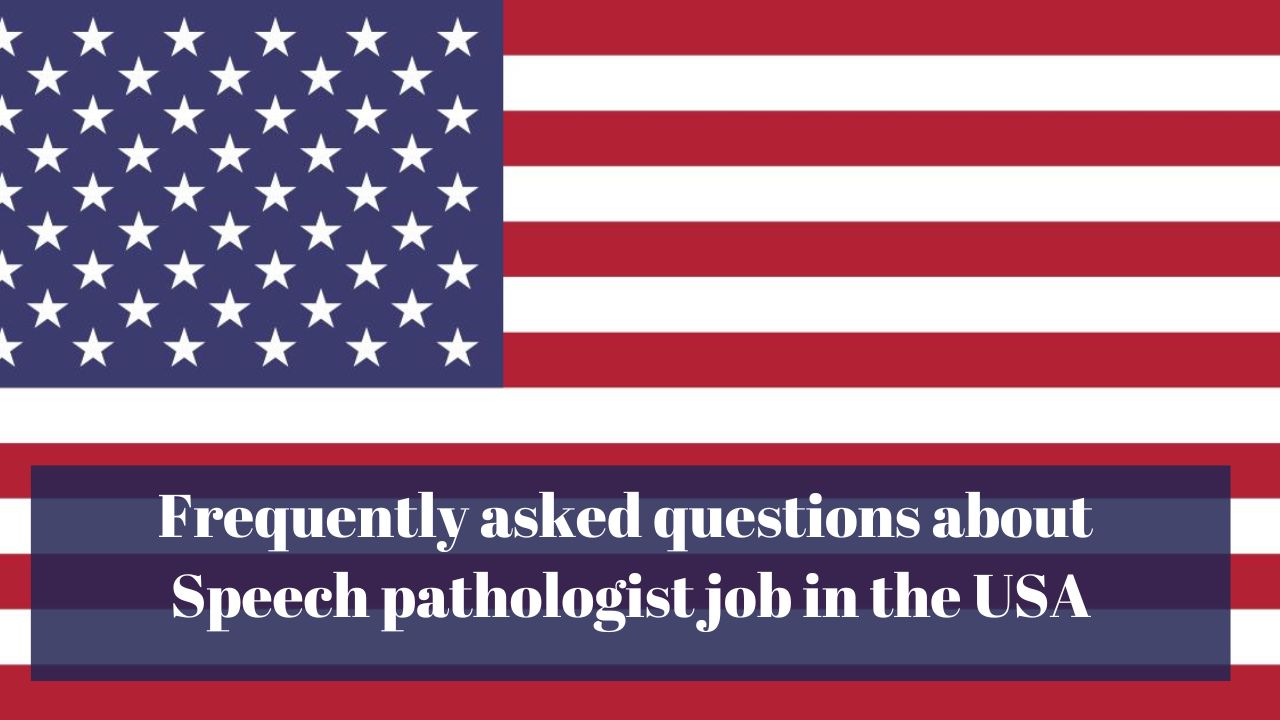Know How to Get a Speech Pathologist Job in USA in 2024
Welcome to our comprehensive guide on pursuing a fulfilling and rewarding career as a speech pathologist in the USA. In this blog post, we’ll provide you with a detailed roadmap to becoming a speech pathologist, exploring the educational requirements, career prospects, salary expectations, and the enriching lifestyle of this profession.
Section 1: Pursuing a Degree in Speech Pathology
Becoming a speech pathologist in the USA requires a solid educational foundation. Aspiring speech pathologists typically begin their journey by pursuing an undergraduate degree in communication sciences and disorders or a related field. These programs provide students with a strong foundation in language development, communication disorders, and speech therapy principles.
After completing an undergraduate degree, individuals interested in becoming speech pathologists typically pursue a graduate program in speech-language pathology. These graduate programs, often master’s programs, delve deeper into speech pathology’s theoretical and clinical aspects, providing students with the necessary knowledge and practical skills to assess, diagnose, and treat individuals with communication disorders.
Aspiring speech pathologists should consider their career goals and aspirations when choosing the right educational path. Some may opt for a more specialized program that aligns with their interests, such as pediatric speech pathology or adult neurogenic disorders. Researching and carefully evaluating different programs to ensure they align with your career objectives is essential. (Speech Pathologist Job in USA)
Section 2: Navigating Your Speech Pathologist Career Journey
After completing the necessary education, the next step is navigating the job market and finding opportunities in speech pathology. Speech pathologists can find job opportunities in various settings, including schools, hospitals, rehabilitation centers, private practices, and research institutions.
Aspiring speech pathologists must explore these diverse employment options and identify the settings that best align with their professional goals and interests.
Building relevant experience through internships and clinical placements is crucial for aspiring speech pathologists. These experiences provide valuable hands-on training and exposure to real-world cases, helping individuals develop the clinical skills and confidence needed to excel in their careers. Many academic programs incorporate clinical rotations or externships to provide students with these opportunities.
Networking also plays a pivotal role in advancing a career in speech pathology. Connecting with potential employers, colleagues, and industry professionals can open doors to job opportunities, mentorship, and ongoing professional development.
Attending conferences, joining professional organizations, and engaging in online networking platforms are effective strategies for building a solid professional network within the speech pathology community. (Speech Pathologist Job in USA)
Section 3: Understanding Salary Expectations for Speech Pathologists
The salary expectations for speech pathologists can vary based on several factors, including experience, location, and the specific industry or setting in which they work.
According to U.S. Bureau of Labor Statistics data, the median annual wage for speech-language pathologists in May 2020 was $80,480. However, it’s important to note that entry-level salaries may be lower, while experienced professionals and those working in specialized fields can command higher earnings.
Geographic location can also significantly impact salary expectations for speech pathologists. For example, metropolitan areas or regions with a higher cost of living may offer higher salaries to offset the increased expenses. It’s essential for aspiring speech pathologists to research and understand the regional variations in salary ranges to make informed decisions about their career paths.
Factors such as additional certifications, specialized training, and bilingual proficiency can also influence earning potential in speech pathology. Pursuing advanced certifications or developing expertise in a niche area of speech pathology can open up opportunities for higher-paying roles and career advancement. (Speech Pathologist Job in USA)
Section 4: Embracing the Lifestyle of a Speech Pathologist
The work environment and day-to-day responsibilities of speech pathologists can be both challenging and incredibly fulfilling. Speech pathologists work with individuals of all ages, from children with developmental delays to adults recovering from strokes or traumatic brain injuries.
Their work may involve conducting assessments, developing treatment plans, and providing therapy to improve communication and swallowing abilities.
The flexibility and diversity of work settings in speech pathology allow professionals to tailor their careers to align with their personal preferences and lifestyles. For instance, some speech pathologists may choose to work in schools to support children with speech and language disorders. In contrast, others may prefer a hospital’s dynamic environment or a private practice’s autonomy.
Balancing work-life commitments is essential for speech pathologists as they strive to make a meaningful impact in their clients’ lives while maintaining their well-being. Practicing self-care, managing caseloads effectively, and seeking professional growth and development opportunities are critical aspects of maintaining a healthy work-life balance in this field.
To provide a personal touch, we have gathered testimonials from practicing speech pathologists to shed light on their experiences and insights into the lifestyle of a speech pathologist. These firsthand accounts offer a glimpse into the daily realities, rewards, and challenges of working in this dynamic profession. (Speech Pathologist Job in USA)
Frequently asked questions about speech pathologist job in the USA

What degree do you need to be a speech pathologist?
It would help if you had a master’s degree in speech-language pathology to become a licensed speech pathologist in the United States.
What undergraduate degree is best for speech pathology?
The best undergraduate degrees to prepare for a master’s in speech pathology are communication sciences and disorders, linguistics, psychology, or education.
What classes should I take for speech pathology?
Recommended undergraduate classes for speech pathology include anatomy, biology, physics, statistics, linguistics, psychology, sociology, public speaking, and courses related to human development.
What skills are needed to be a speech pathologist?
Important skills for speech pathologists include communication, patience, creativity, empathy, problem-solving, attention to detail, ability to motivate others, and ability to work as part of a healthcare team.
Do speech therapists need to be certified?
Yes, it would help if you were approved by the American Speech-Language-Hearing Association (ASHA) to legally practice as a speech therapist. This requires a master’s degree and passing the national exam.
How much do speech-language pathologists earn?
According to the Bureau of Labor Statistics, the average annual pay for speech-language pathologists was $80,480 per year ($38.69 per hour) in 2021. Those working in schools may earn less.
What is the job outlook for speech therapists?
Employment of speech-language pathologists is projected to grow 25 percent from 2020 to 2030, much faster than the average for all occupations. As baby boomers age, demand will increase for speech therapy services.
Should I get my master’s degree in speech pathology online or on campus?
Both online and on-campus speech pathology master’s degrees have pros and cons. Online programs offer more flexibility but fewer hands-on clinical interactions. On-campus provides more face-to-face instruction and access to clinics.
Is a PhD in speech pathology worth it?
A PhD in speech-language pathology is only required if you want to work in research or university teaching. PhDs do not provide any clinical advantages over a master’s degree in speech therapists in medical and school settings.
How competitive is speech pathology graduate school?
Speech pathology graduate programs are very competitive, with average acceptance rates around 20-30%. Applicants with research experience, high GPAs (3.5+), and strong letters of recommendation have the best chances.
How much does a speech pathology school cost?
The total cost for a master’s in speech pathology, including tuition, fees, and clinical materials, ranges from $30,000 to $60,000 at public universities and $60,000 to over $100,000 at private universities.
What GPA do you need to get into graduate school for speech pathology?
Most speech pathology graduate programs require a minimum 3.0 GPA to apply. However, the average GPA for accepted students is around 3.6 due to the competitive nature of admission. A higher GPA improves your chances.
What GRE scores are required for speech pathology graduate school?
Many speech pathology master’s programs require GRE scores with minimum targets of around 150 Verbal, 141 Quantitative, and 4.0 Analytical Writing. The higher your scores compared to program averages, the better.
How many schools should I apply to for speech pathology?
Applying to 5-8 graduate speech pathology programs is recommended to maximize your chances of admission. Be sure to apply to a balance of reach, match, and safety schools.
How much does it cost to apply to speech pathology graduate school?
The cost to apply to speech pathology master’s programs ranges from $50-$150 per school application fee plus the GRE fees, CASPer test fees, and costs associated with the application process. Many recommend budgeting $1000+.
What is the speech pathology graduate school application timeline?
Most speech pathology graduate programs have application deadlines between January and March. Rolling admissions allows flexibility for some schools. Give recommend giving yourself 4-6 months to prepare quality application materials.
Should I take the subject GRE for speech pathology graduate school?
Top speech pathology programs like Vanderbilt, UPenn, and Northwestern recommend taking the GRE psychology subject test. Scores above the 68th percentile can offset lower verbal/quantitative scores.
Do you need clinical experience to apply for speech pathology programs?
Yes, most speech pathology graduate programs require applicants to complete a minimum of 25-50 clinical observation hours under an ASHA-certified speech therapist. Some require 100+ hours.
What percentage of speech pathology applicants get accepted?
Speech pathology master’s programs are highly competitive, with average acceptance rates around 20-35%. The more competitive your grades, test scores, and experience versus applicant pools, the better your chances.
How important are letters of recommendation for speech pathology graduate school?
Strong letters of recommendation from speech therapists and professors who know you well are very important for speech pathology graduate school applications. Letters should speak to your clinical skills.
What do you write about for the speech pathology personal statement? Focus your statement on what sparked your interest in speech therapy, relevant experiences that prepared you, knowledge of the field, patient interactions illustrating your strengths, research/projects showcasing initiative, and professional goals.
Should I take a gap year before applying to speech pathology graduate school?
Taking a gap year to gain clinical experience can significantly improve your chances of getting into competitive speech pathology master’s programs. Programs prefer applicants with strong exposure to the field.
Which speech pathology graduate programs are the most competitive?
The most competitive speech pathology master’s programs include Northwestern University, UPenn, Vanderbilt, University of Washington, NYU, University of Texas at Austin, and the University of Wisconsin-Madison. These accept around 20-25% of applicants.
Can I complete the CFY (clinical fellowship) requirement part-time?
Yes, ending the Clinical Fellowship (CF) part-time over the years is possible instead of full-time in 1 year. This allows you to work another job simultaneously. Part-time CFs must still meet the same-hour requirements.
How long does it take to become a licensed speech therapist?
Becoming a licensed speech pathologist takes 7-8 years: 4 years for a bachelor’s degree, 2 years for a master’s, then 1 year for the clinical fellowship (CF), followed by passing the national exam for state licensure and ASHA certification.
What types of places hire speech therapists?
Speech therapists work in schools, pediatric clinics, nursing homes, rehabilitation centers, hospitals, home health agencies, assisted living facilities, government agencies, and private practice clinics.
What is the job outlook for speech therapists in schools?
Employment of speech-language pathologists in schools is projected to grow 15 percent over the next decade, faster than the average across all occupations. Greater awareness of communication disorders in children will drive demand.
Do you need teaching credentials to work as a school speech therapist?
Public school speech therapists are not required to have teaching credentials. However, obtaining a special education teaching permit and a master’s in speech pathology makes you more competitive for school-based jobs.
How much do school speech therapists earn?
According to Payscale, school speech pathologists have an average annual salary range of $47,774 to $81,472 annually, with the national average at $63,645 annually. This is lower than speech therapists working in healthcare settings.
What states pay speech therapists the highest salaries?
The top producing states for speech pathologists include Nevada, California, Washington, Texas, New Jersey, and New York based on average salaries. These tend to have higher costs of living that influence wages.
What countries have the highest demand for speech therapists?
Some countries with increased demand for qualified speech-language therapists willing to relocate include Australia, New Zealand, Canada, England, Switzerland, Germany, Norway, and some countries in the Middle East like Saudi Arabia or UAE.
What type of visa is required to work as a speech therapist in another country?
The main types of working visas for foreign speech therapists looking for jobs in another country are temporary work visas such as the J-1 Exchange Visitor visa or H-1B skilled worker visa in the USA. Requirements vary greatly between countries.
Do hospitals hire speech therapists? What is their salary range?
Yes, many larger hospitals employ speech pathologists, especially those with stroke rehabilitation or brain injury units. According to salary data, hospital speech therapists earn an average of $80,000 to $115,000, depending on experience and location.
Do speech therapists make more in skilled nursing facilities or schools?
Speech pathologists in skilled nursing facilities earn higher salaries on average than those working in school settings. In facilities, salaries range from $75,000 – $105,000 to $55,000-$85,000 in schools.
Which medical settings pay speech pathologists the highest salaries?
Speech therapists can make the highest wages working in acute care hospitals that operate around the clock and bring in revenue through reimbursements for medically necessary therapy services.
Conclusion
In conclusion, pursuing a career as a speech pathologist in the USA offers a wealth of opportunities for individuals passionate about making a difference in the lives of others. From laying the educational groundwork to navigating the job market, understanding salary expectations, and embracing the lifestyle of a speech pathologist, this profession presents a fulfilling and impactful career path.
We hope this guide has provided valuable insights into becoming a speech pathologist and addressed critical considerations related to degree requirements, career prospects, salary expectations, and lifestyle considerations.
Suppose you have further questions or wish to engage in discussions about pursuing a career as a speech pathologist. In that case, we encourage you to reach out and continue exploring the exciting possibilities within this field.
Thank you for visiting Jobs Ada







